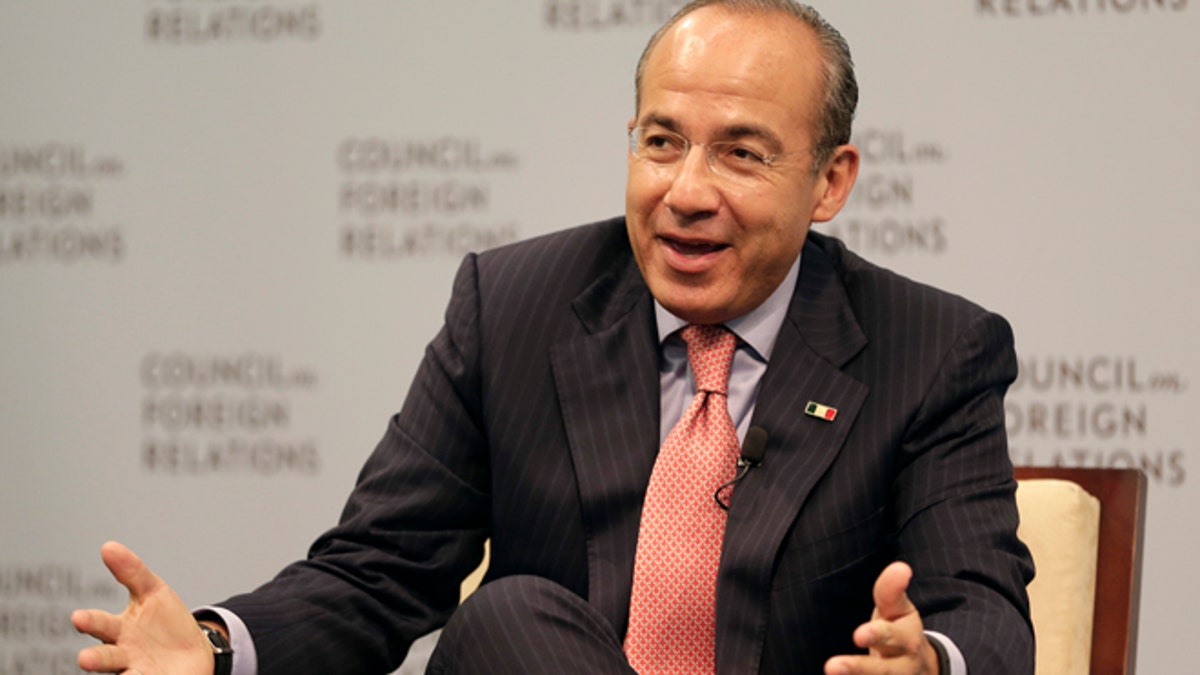
Mexican President Felipe Calderon answers a questions after speaking at the Council on Foreign Relations in Washington, Monday, Sept. 24, 2012. (AP Photo/Jacquelyn Martin) (AP2012)
Former Mexican President Felipe Calderón lamented the label of the crisis his country faced – and continues to face – between government forces and the country’s drug cartels as a “war” and not a drug strategy.
Speaking this week at Harvard University, where the former Mexican leader is serving a one-year teaching appointment at the Kennedy School of Government, Calderón admitted that his administration failed in clearly communicating his security policy toward drug cartels, according to news agency Agence France-Presse.
During Calderón’s six years in office, an estimated 70,000 people died in violence related to the country’s ongoing drug war. An escalation in murders and other violent crimes arose soon after Calderón took office in 2006, when he declared an all-out military blitz on Mexico’s brutal cartels.
Besides the death toll, Mexico’s cartels – and with them, violence – have spread from certain regions along the U.S.-Mexico border to other parts of the country once free of violence, including resort areas such as Acapulco and metropolitan hubs like Monterrey and Guadalajara.
During his speech, Calderón said he decided to confront the cartels to prevent further crimes, but especially to apply the law in places where criminals were taking control over local governments. He also said that Mexico’s march toward a middle class nation has led the country to now become a major consumer nation – not just trafficking – of illicit substances, according to AFP.
- Mexico Cartel Sends Outgoing President Calderon a Goodbye Note
- Harvard’s Dean Defends Felipe Calderon Appointment; Calls it ‘Unique Opportunity’
- Mexico’s Calderon Defends Juarez Policy in Harvard Commentary
- After Six Years, Mexico’s President Felipe Calderon Fell Short of Goals
- Former Mexican President Calderon Moves to the US Within Days of Leaving Office
- Jobless Mexicana Flight Attendants Pose for Calendar
Calderón and Harvard faced a slew of criticism regarding his appointment at the Kennedy School earlier this year. The online petition site Change.Org collected nearly 33,000 signatures in opposition to Harvard’s appointment of Calderón and Mexican political activist and poet Javier Sicilia sent a letter to the university, called the former president’s appointment an affront to the victims of the bloodshed in Mexico.
The Kennedy School defended its appointment of Calderón, arguing that as an educational institution it welcomes varying view points and theories.
“The School has a long tradition of providing an opportunity for leaders from around the world to speak to and interact with the community on important public policy issues,” Ellwood said in a statement.
“The unique opportunity to engage in direct discussion with a former head of state is one that many of our students value greatly, even if they may disagree with some of that leader’s policy positions,” Ellwood said.
Some academics argue that appointments of former world leaders at U.S universities is always divisive -- such as Georgetown’s appointment of former Colombian President Alvaro Uribe -- but Calderon’s hiring is even more poignant given the human rights crisis in Mexico.
“This one is even more so given the number of deaths in Mexico,” Monica Rankin, an assistant professor of history at the University of Texas at Dallas, told Fox News Latino in January.
Follow us on twitter.com/foxnewslatino
Like us at facebook.com/foxnewslatino
